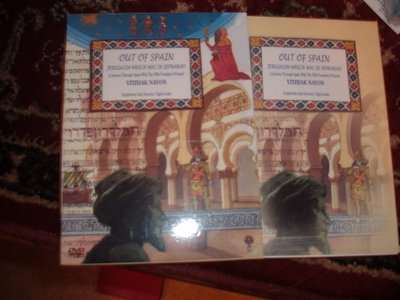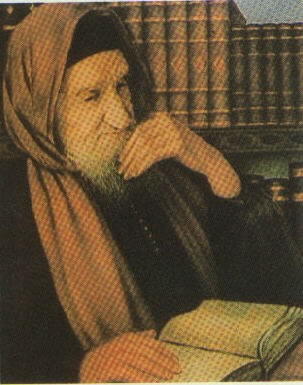 Rabbi Yisrael Abuchatzeirah - The Baba SaliBorn: Tafillalt, Morocco,1890Died: Israel, 1984Popularly known as "Baba Sali" (our praying father).
Rabbi Yisrael Abuchatzeirah - The Baba SaliBorn: Tafillalt, Morocco,1890Died: Israel, 1984Popularly known as "Baba Sali" (our praying father).Rabbi Yisrael Abuchatzeirah, was of a well-known rabbinical dynasty. His grandfather was the famous tzaddik, Rabbi Yaakov Abuchatzeirah. He had great skill in Talmudic interpretation and many of his halachic decisions were accepted and took root among his followers. He was regarded as someone who possessed the Ruach Hakodesh or "Divine Spirit". Although still very young, people flocked to R' Yisrael for blessings for their parnassa (income), family, and health. Consequently he became known as "Baba Sali," (our praying father) because of the prayers that he would invoke on behalf of those who sought out his guidance.
One day, young Yisrael's father told him, "My child, you have a great power to bless people which you cannot measure. Your words can bring great help to men. From now on, you must use this power to say good things about others and to bless them."
Young Yisrael gave his word. Soon it became known that the blessings of this young child brought miraculous results. He became famous as Baba Sali. A master of the Kabbalah and a great Torah Sage, he took over his father's position as head of the yeshiva and Rabbi of the community. Although he regularly gave many lectures in Torah and kabbalah, he did not permit his students to write them down because he wanted his scholarship to remain unknown. Nevertheless, his fame as a holy man and a righteous Tzaddik continued to draw Jews to him from all over. Even Arabs came to receive his blessings and the coins he gave for charity.
At 19 he was inducted as the Rosh Hayeshiva, after his father's death. After an extended one year trip to Erets Yisrael he returned, and was compelled to take the position of Rav of the kehilla (community) after the murder of his brother by an Arab. He gave daily lectures, served as a judge in the beit din (rabbinical court), and set the tone for the kehilla. The community appreciated that nothing escaped his holy, penetrating eyes. From throughout Morocco, people converged on his home for his brachot (blessings), his counsel, and his encouragement.
In 1964 when Baba Sali noted that much of Moroccan Jewry had emigrated to Eretz Yisrael, he followed them to fulfill his dream of settling there. Baba Sali chose Yavne as his home because many of his followers had settled there.
In 1970 he moved to Netivot where he was steadily visited by Chassidim, Ashkenazim and Sephardim who sought his unique counsel. He stressed emunah (faith), humility, ahavat Yisrael (love of fellow Jews) and kiyum hamitzvot (fulfillment of mitzvot). His phenomenal memory allowed him to access information at will, whether it dealt with law, Talmud, Kabbalah,etc.
He was very humble and did not want to attract attention, however, his prophetic powers and his miraculous prayers soon became renowned. Thousands of Jews from all over the world would come to seek his advice and blessings for children, health, and livelihood. Baba Sali was very close to other great Torah scholars, especially the Lubavitcher Rebbe , whom he referred to as "the Great Eagle in the Heavens." He strongly encouraged the Rebbe's Mitzvah campaigns, especially urging young girls to light candles for Shabbat and Yom Tov.
The Power of PrayerA story of the Baba Sali as heard from R' Moshe Aharon Stern of JerusalemThere was once a simple Israeli worker from Jerusalem, who, though he had been married a long time, had never been blessed with children. He had been to all the specialists, but to no avail. "Hair will grow on the palm of your hand before you see a child," the doctors had told him. After years of hope and despair, he had almost given up. Then he heard about the great miracles wrought by the prayers of Rabbi Israel Abuchatzira.
With an expectant heart, the man traveled several hours from Jerusalem to Netivot, to the home of the Baba Sali. When he arrived, he found a long line of petitioners already ahead of him, and had to wait hours before entering to receive a blessing. Finally, his turn arrived. He entered the tzaddik's room, nervous, eyes downcast, clutching a small piece of paper on which he had written his only request: Children! He sat down and placed the paper on the table before the Baba Sali. The tzaddik opened it, then put it down. "Matzav avud," was all he said. "A lost case." Before he could open his mouth, the man had been whisked out of the chamber by the attendants to make room for the next petitioner. Shocked, brokenhearted, he returned to his home.
The next day, however, when the people began lining up for blessings, there he was again. Again he waited several hours. Again he entered, put his slip of paper on the table, and again he heard the same terrible answer -- "a lost case." Yet, when the next day arrived, there he was again, and the next day again! Every single day, as long as the Baba Sali was receiving people for blessings, the man would be there in line, at times waiting hours. And always he would hear the same sad answer, "a lost case."
Finally, after almost a year, the family of the Baba Sali took pity on this man and approached the great saint with their request. "Rabbeinu Israel," they said, "this poor man has been coming to you for a year straight now, and every time you give him the same answer. Can't you tell him to stop coming already? It's much too heartbreaking to continue." "How long has it been?" Rabbi Abuchatzira inquired. "We've counted, today is his two hundredth visit." The Baba Sali agreed to talk with him. That afternoon, the man entered the room as usual and placed his slip of paper on the table before the Baba Sali. This time, the tzaddik did not even pick it up.
"Listen, my friend," he said gently. "You have been coming to me every day for a very long time. Haven't I already told you that it is a lost case. Go home, why do you insist on coming to me?" The man lifted his eyes. "I come to you every day, and I will keep coming to you every day, because I believe in the power of prayer, and I believe that God listens to your prayers, and that you are the only one in the world who can help me."
"Do you really believe that?" the Baba Sali responded. "If so . . ." he rose from chair, "go out right now and buy a baby carriage!" The man gave a start. He jumped up and ran out of the room. "I got a blessing! I got a blessing!" he cried. That night he presented his wife with a beautiful new baby carriage. Nine months later, they had a child.
The New Mikvehby Rav Moshe Weber, ShlitaNear the home of Rabbi Yisrael Abuchatzeirah we built a new mikvah, during the month of Tamuz, in the midst of the dry, hot summer. When the structure was complete, we lacked water - rain water, of course, in order to finish the mikvah. Our master, the Baba Sali, lifted his eyes to Heaven, and proclaimed, "Master of the universe - You commanded us to behave in holiness and purity. So, we desire to fulfill Your will. Please, please, for the sake of Your great name, let it rain!"
Suddenly, clouds gathered in the sky, and instantly, rain fell! In no time at all, the mikvah filled with water. However, we realized that the mikvah was not quite built according to the opinion of the Beit Yehuda, so we informed our master, our teacher, the Baba Sali. Immediately, he ordered us to drain the mikveh. Someone raised an objection - "It does not rain like this in the middle of the summer ," they said. "This is a rare miracle!" He turned to Baba Sali, and said, "I take it upon myself, the sin, that this mikvah is not perfect, built according to the opinion of the Beit Yehuda."
But our teacher, our master, the Baba Sali, stood firm, replying, "we are obligated to empty the mikveh." So, we drained the mikvah, and completed the design according to the Beit Yehuyda, in splendor and perfection.
The Baba Sali then raised his eyes to Haven again, and beseeched of Hashem: "Master of the universe, you know very well that we made this mikveh not for my honor, or the honor of my father, but rather, only to increase the increase purity among Israel, Your people. Please, don't turn Your face from us, and let it rain! Let the mikveh will with fresh, new rain water..." Then, as before, in the midst of the dry, scolding summer, the sky darkened... clouds gathered... and rain began to fall.
The Baba Sali wrote many discourses about the Torah, Shavuot, Shabbat HaGadol, Shabbat Zachor and the power of tzdaka. Baba Sali was laid to rest in Netivot. An estimated 100,000 were there to pay their respects to a tzadik who had devoted his life to his people. Still today his grave is a place visited everyday.
May the merit of the tzaddik Rabbi Yisrael Abuchatzeirah - The Baba Sali protect us all, Amen.



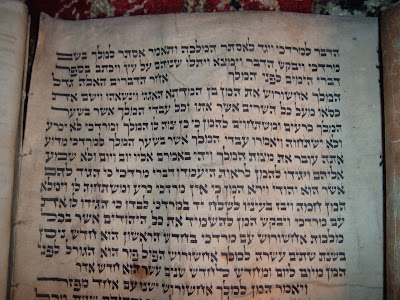




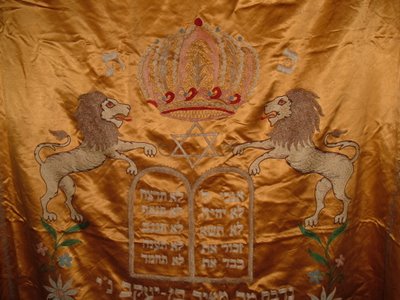
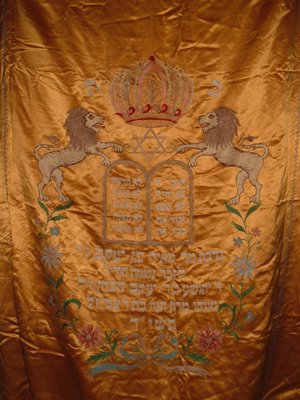
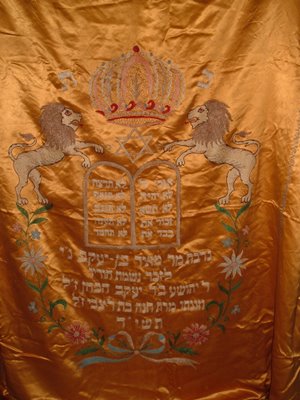 MOST BEAUTIFUL PAROCHET
HUGH LIONS AND CROWN
MOST BEAUTIFUL TORAH BOOK CLOSET COVER HAND EMBROIDERED MADE MANY YEARS AGO, MUST BE SUZANI STYLE FROM TURKEY OR BULGARI COVER HUGE SIZE.
APPROX. 75 INCH WIDE * 70 INCH
IT HAS INSCRIPTIONS ON DATED 1954 BUT IT SEEMS TO BE EARLY CLOTH MAYBE EVEN 19TH CEN.
A TORAH CLOSET COVER LIKE THIS WILL COST 500 - 800 USD.
ALL HAND MADE BY AN ARTIST, YELLOW MADE OF WHAT I THINK IS SILK, GOLD & SILVER STRINGS USE WITH AMAZING PATTERNS ON.
GREAT CONDITION ONE TINY TEAR ALMOST CAN NOT BE NOTICED, NO MOTH SIGNS, I DO NOT THINK IT WAS USED MUCH IF ANY.
AMAZING RARE ITEM
MOST BEAUTIFUL PAROCHET
HUGH LIONS AND CROWN
MOST BEAUTIFUL TORAH BOOK CLOSET COVER HAND EMBROIDERED MADE MANY YEARS AGO, MUST BE SUZANI STYLE FROM TURKEY OR BULGARI COVER HUGE SIZE.
APPROX. 75 INCH WIDE * 70 INCH
IT HAS INSCRIPTIONS ON DATED 1954 BUT IT SEEMS TO BE EARLY CLOTH MAYBE EVEN 19TH CEN.
A TORAH CLOSET COVER LIKE THIS WILL COST 500 - 800 USD.
ALL HAND MADE BY AN ARTIST, YELLOW MADE OF WHAT I THINK IS SILK, GOLD & SILVER STRINGS USE WITH AMAZING PATTERNS ON.
GREAT CONDITION ONE TINY TEAR ALMOST CAN NOT BE NOTICED, NO MOTH SIGNS, I DO NOT THINK IT WAS USED MUCH IF ANY.
AMAZING RARE ITEM
 Sinagoga Santa Maria La Blanca Toledo-Espana
Sinagoga Santa Maria La Blanca Toledo-Espana
